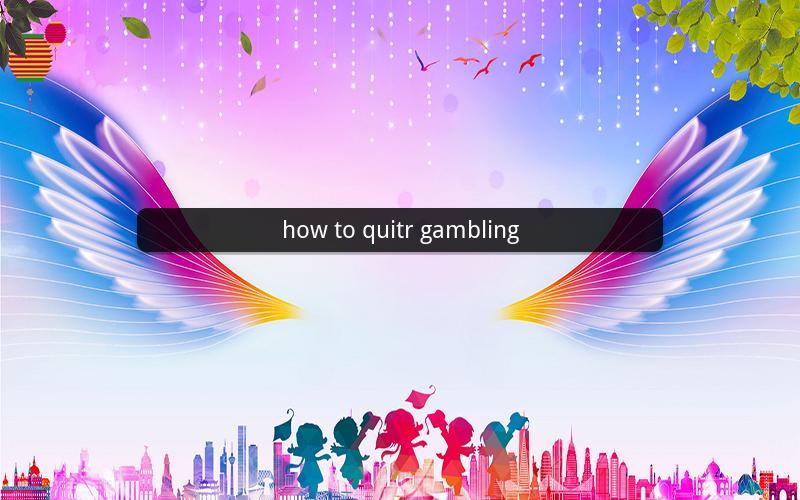
Table of Contents
1. Understanding the Problem
2. Recognizing the Signs
3. Building a Support System
4. Seeking Professional Help
5. Developing a Relapse Prevention Plan
6. Financial Management
7. Engaging in Alternative Activities
8. Mindfulness and Stress Reduction Techniques
9. Setting Goals and Celebrating Progress
10. Staying Committed to Change
1. Understanding the Problem
Gambling addiction, also known as problem gambling, is a behavioral disorder characterized by an inability to control the urge to gamble. It can lead to severe financial, emotional, and social consequences. To quit gambling, it is crucial to first understand the nature of the problem and its impact on your life.
2. Recognizing the Signs
Identifying the signs of gambling addiction is the first step towards quitting. These signs include a preoccupation with gambling, neglecting responsibilities, lying about gambling activities, and experiencing negative consequences due to gambling.
3. Building a Support System
A strong support system is essential for overcoming gambling addiction. This can include family members, friends, support groups, or professionals. Communicate your intentions to quit and seek their support in your journey.
4. Seeking Professional Help
Professional help can provide you with the necessary tools and resources to overcome gambling addiction. Therapists, counselors, and addiction specialists can offer personalized guidance and support.
5. Developing a Relapse Prevention Plan
Relapse is a common challenge in overcoming gambling addiction. A relapse prevention plan helps you identify potential triggers and develop strategies to cope with them. This plan should include coping mechanisms, support systems, and reminders of your goals.
6. Financial Management
Gambling addiction often leads to significant financial problems. It is essential to take control of your finances by creating a budget, seeking financial counseling, and addressing any outstanding debts. Avoiding access to gambling funds is crucial to prevent relapse.
7. Engaging in Alternative Activities
Finding alternative activities to replace gambling can help reduce cravings and provide a healthier outlet for your time and energy. Consider hobbies, exercise, socializing, or volunteer work to keep yourself occupied and engaged.
8. Mindfulness and Stress Reduction Techniques
Stress and boredom often trigger gambling cravings. Mindfulness and stress reduction techniques, such as meditation, deep breathing exercises, and yoga, can help manage these emotions and reduce the urge to gamble.
9. Setting Goals and Celebrating Progress
Setting achievable goals and celebrating progress along the way can provide motivation and a sense of accomplishment. Track your progress and reward yourself for reaching milestones in your journey to quit gambling.
10. Staying Committed to Change
Quitting gambling is a lifelong commitment. Stay committed to your goals by reminding yourself of the reasons why you want to quit and the negative consequences of continued gambling. Surround yourself with positive influences and avoid triggers that may lead to relapse.
Now, let's explore ten related questions and their answers:
1. Q: How can I identify if I have a gambling addiction?
A: Look for signs such as preoccupation with gambling, neglecting responsibilities, lying about gambling activities, and experiencing negative consequences due to gambling.
2. Q: Can I quit gambling on my own?
A: While it is possible to quit gambling on your own, seeking support from friends, family, or professionals can increase your chances of success.
3. Q: Are there any medications that can help with gambling addiction?
A: Currently, there are no medications specifically designed to treat gambling addiction. However, certain medications may be prescribed to manage underlying mental health conditions that contribute to gambling addiction.
4. Q: How long does it take to overcome gambling addiction?
A: The duration of overcoming gambling addiction varies for each individual. Some may experience immediate relief, while others may require ongoing support and treatment for an extended period.
5. Q: Can I gamble responsibly?
A: Responsible gambling is a myth. Once someone has developed a gambling addiction, it is difficult to gamble responsibly. It is important to focus on quitting entirely.
6. Q: Can I use willpower alone to quit gambling?
A: While willpower is important, overcoming gambling addiction often requires a combination of strategies, support, and professional help.
7. Q: Can I join a support group for gambling addiction?
A: Yes, there are numerous support groups available for individuals struggling with gambling addiction. These groups provide a safe and supportive environment to share experiences and receive guidance.
8. Q: Can I use technology to help me quit gambling?
A: Yes, there are various apps and online resources available to help individuals quit gambling. These tools can provide reminders, track progress, and offer coping strategies.
9. Q: Can I continue gambling if I have a relapse?
A: A relapse is a setback, but it does not mean you cannot recover. Acknowledge the relapse, learn from it, and resume your efforts to quit gambling.
10. Q: How can I support a loved one struggling with gambling addiction?
A: Offer unconditional support, encourage them to seek professional help, and be patient. Educate yourself about gambling addiction to better understand and support your loved one's journey to recovery.